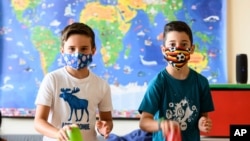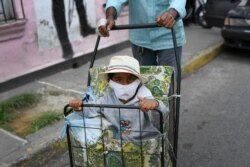Children ages 12 and older should wear a face mask in the same situations an adult should, while children ages 6 to 11 should wear them as risks require, the World Health Organization and UNICEF said, to stem the spread of the coronavirus.
Older children could play more of a role in virus transmission than younger children, the two organizations said, adding that more information is needed to help understand how children of all ages may help spread the virus, which causes COVID-19.
The situations in which older children should wear a face mask include when a distance of 1 meter from others cannot be guaranteed and when there is widespread transmission in the community, the WHO and UNICEF said in a document dated August 21.
For younger children, parents should consider their children’s access to a mask and ability to use it, the intensity of transmission in the area, and adequate adult supervision, the two organizations said.
Children younger than 5 should not be required to wear masks, the WHO and UNICEF said.
The coronavirus death toll topped 800,000 Saturday, according to Johns Hopkins University, which also reported more than 23 million cases worldwide.
As it has for months, the U.S. continues to lead the world in COVID-19 deaths, with more than 176,000, and infections, with more than 5.6 million.
Health officials in the U.S. believe the number of infections in America may be 10 times greater than reported because of a lack of testing and reporting.
The grim news comes as an analysis by The Associated Press and The Marshall Project, a nonprofit news organization covering the criminal justice system, found that while people of color make up just less than 40% of the U.S. population, they accounted for about 52% of all the “excess deaths," those above normal through July.
The report defined excess deaths as the number of people above the typical number of those who die in the United States during the first seven months of the year, based on figures from the Centers for Disease Control and Prevention.
On Saturday, U.S. President Donald Trump, without evidence, accused employees of the U.S. Food and Drug Administration of working to slow testing of COVID-19 vaccines until after the November presidential election.
In a tweet, Trump said the slowdown is the work of the so-called “deep state,” a conspiracy theory suggesting federal workers constitute a hidden government entrenched within the legitimate government.
Trump’s comments came after Reuters first reported on Thursday that a senior FDA official said he would step down if the Trump administration approved a vaccine before it was declared safe and effective.
U.S. House Speaker Nancy Pelosi told reporters Saturday on Capitol Hill that Trump made a “dangerous statement” about FDA employees and added Trump is “beyond the pale.”
The World Health Organization’s emergencies chief Mike Ryan said Friday the scale of the pandemic in Mexico is "under-recognized" and that testing there is limited.
He told a Geneva briefing that Mexico was testing about 3 people per 100,000, compared with about 150 tests per 100,000 people in the United States.
Mexico is nearing 60,000 deaths and 550,000 cases of the virus, according to Johns Hopkins.
South Korea is imposing a nationwide ban on large gatherings, closing churches, nightclubs and beaches. In addition, fans will not be allowed at professional sports events.
Health Minister Park Neung-hoo said Saturday the new nationwide restrictions, which begin Sunday, follow nine days of triple digit increases in coronavirus cases. The Korea Centers for Disease Control and Prevention recorded 332 new cases Saturday. The country has more than 17,000 coronavirus infections and more than 300 deaths.
Several European countries have been reporting new surges of COVID-19 cases.






